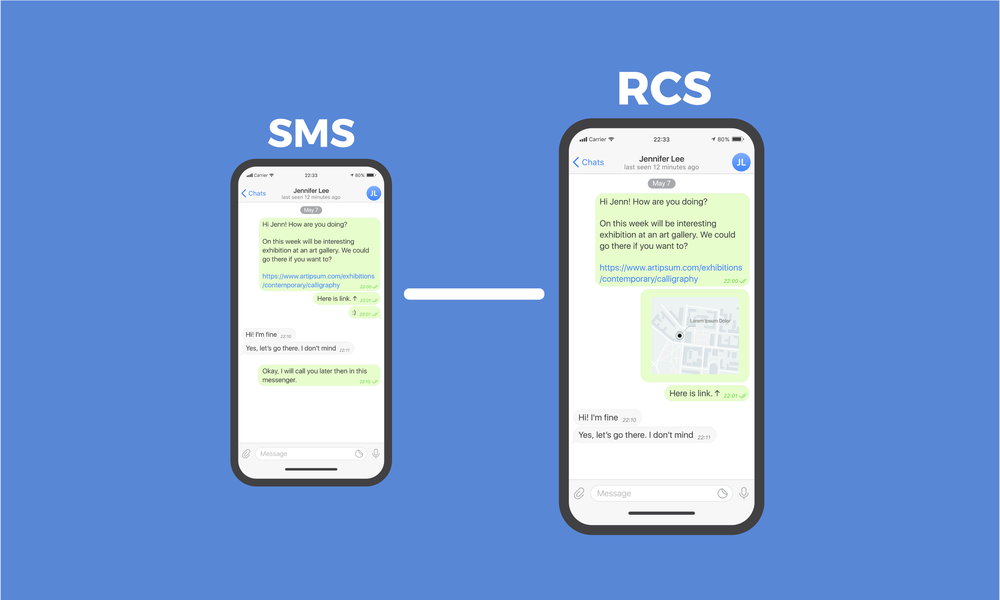What is the difference between SMS and RCS?
To clarify the difference between RCS and SMS, it can be said that Short Message Service (SMS) is a simple and widely used communication protocol that works on all mobile phones and is used for sending and receiving text messages. However, RCS offers significant upgrades in available features. RCS allows you to send images, videos, GIFs, web links, and other rich content, providing a more detailed and interactive messaging experience.
What is SMS?
Short Message Service (SMS) is a protocol used for sending and receiving short text messages. The process of sending and receiving messages occurs over your mobile network and works even without a data plan. Although receiving SMS messages is usually free, a mobile network operator may impose separate charges for sending a text message. It should be noted that no media such as images, videos, audio, or GIF files can be sent through SMS.
SMS messages were designed in the early days of mobile phones to complement voice calls. However, this protocol has outdated features compared to modern messaging applications and social media. For example, SMS messages are limited to 160 characters maximum, including numbers and symbols. If you exceed the character limit in a single short message, the additional characters will move to subsequent short messages, potentially fragmenting the conversation depending on the messaging app used on your phone. On modern smartphones, this is not a significant issue, but it should be taken into consideration if you have a basic phone.
Now, let's talk about the concept of RCS.
What is RCS?
The comparison between Short Message Service (SMS) and Rich Communication Services (RCS) reveals significant differences between them. RCS is considered an evolution of traditional SMS, offering a wide range of additional features that make it a competitor to modern instant messaging applications.
One of the key differences between SMS and RCS is RCS's ability to accommodate a larger number of characters in each message. Additionally, RCS allows sending all types of media such as images, videos, and GIF files. It can also be used for sending location data and creating group chats. Furthermore, RCS enables read receipts, and messages are encrypted to enhance security, as it relies on internet data rather than the traditional phone network.
However, there are some conditions that need to be met to use RCS. While SMS is practically available on all phones, using RCS requires a phone that supports this protocol, being on a carrier that supports RCS, and the recipient also having the same requirements. If these conditions are met, conversations can take place using RCS.
In summary, RCS is a technology that provides a similar experience to modern instant messaging applications, enabling multimedia sharing, group chats, encryption, but it requires some conditions to access it. On the other hand, SMS remains available on most phones without additional requirements.
Comparison of SMS vs RCS:
Messaging Service Comparison
| Category | SMS | RCS |
|---|---|---|
| Availability | Available on all phones. | Requires support from both the smartphone and the carrier. |
| Network Requirements | Requires a mobile network (cellular). | Requires an internet connection (cellular or Wi-Fi). |
| Character Limit per Message | Supports 160 characters. | No practical limit on the number of characters. |
| Media Attachments | Does not support attaching any type of media. | Supports attaching all types of media. |
| Encryption | No encryption. | Can be encrypted based on the sending and receiving application. |
| Delivery and Read Receipts | Only delivery receipts, no read receipts. | Both are available. |
| Cost | Carrier charges often apply per SMS message. | No cost. |
| Additional Features | No additional features. | Group chats, typing indicators, message reactions. |
| Business-focused Features | No additional features. | Branding, business verification, custom response actions, rich information cards, QR codes. |
As seen in the comparison above, RCS is superior to SMS, with the only advantage of SMS being its availability on almost every mobile phone, whether it's a feature phone or a smartphone. One of the main obstacles preventing wider adoption of RCS is that iPhones do not support it at all, forcing all text communications between iPhones and Android devices to be limited to SMS only.
Who Can Use RCS?
RCS protocol has broad support from most major carriers around the world. In terms of smartphones, all Android devices can use RCS, but it requires using a compatible client. The pre-installed Google Messages app on most phones supports this protocol, and if not pre-installed, it can be downloaded from the Play Store. Additionally, the Samsung Messages app and many other apps also support this protocol.
On the other hand, iPhones do not support the RCS protocol at all. Apple prefers to use its own iMessage service for text messaging between iPhones. If an Android user tries to send an RCS message to an iPhone, the message will fall back to SMS format. This is the main point of contention between the "blue bubble" and "green bubble" debate, where all iMessage conversations appear in blue while all SMS conversations appear in green.
Should you use RCS or SMS?
Considering the long list of benefits provided by RCS, it would be illogical not to take advantage of it. Its new features breathe new life into traditional text messages. Once you get used to them, you will find it difficult to go back to the old style. The only time when traditional text messages might be suitable is when they are widely spread, and when sending a message of this kind, you can be confident that the recipient has received it. For this reason alone, traditional text messages will remain a part of our lives, even though they have become marginalized with the existence of technologies like RCS and other advanced instant messaging applications.





